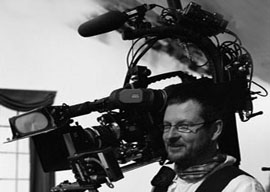
June 13, 2012

Lars von Trier
Like many in the movie business, the director was raised in a countercultural home with few rules. His father, a Jewish leftist and his mother a gentile communist, bestowed upon him the proletarian name “Lars Trier.” Yet at film school, the other students started to call him “Lars von Trier” due to his imperious manner. Trier decided the aristocratic “von” fit.
In 1989, when he was 33 and already Danish cinema’s enfant terrible, his mother confessed to him on her deathbed that she had cuckolded her unambitious late husband in a homemade eugenics project to give her son more artistic genes. In truth, his biological father was a gentile Dane descended from the famous Teutonic-Danish Hartmann family of classical composers. In a 2005 interview, Von Trier laughed:
And you then feel manipulated when you really do turn out to be creative. If I’d known that my mother had this plan, I would have become something else. I would have shown her. The slut!
There’s also a higher level of joke that von Trier only glancingly touched upon: Western aesthetic life is being dumbed down by the ever-growing frenzy to punish Hitler retroactively by writing the Germans out of European cultural history. In particular, the huge Ashkenazi debt to German thought is being eased down the memory hole.
Strangely enough, this did not happen immediately after WWII. For decades afterward, the most celebrated Jewish thinkers”Marx, Freud, and Einstein”were all depicted as German-speaking Herr Professor types.
Consider Kubrick’s 1968 movie 2001: A Space Odyssey, which to suspicious 21st-century eyes sounds practically Hitlerian. 2001 begins with Richard Strauss’s tone poem Also sprach Zarathustra, which is named after Friedrich Nietzsche’s book celebrating the coming of the Ãbermensch. Indeed, Kubrick’s 2001 is largely a Nietzschean allegory of evolution from ape to man to Superman. And Nietzsche was viscerally impacted by the anti-Semitic Wagner.
De-Teutonification is a popular project. Wagner was Hitler’s favorite composer, so what more do you need to know? Today, Wagner, Nietzsche, and Strauss are all seen as tainted quasi-Nazis. Yet in 1968, Kubrick didn”t have to put up with questions about whether he was a self-hating Jew for making 2001. It was simply assumed back then, especially by Jewish critics, that high culture was inextricably Germanic.
Today, though, our history is being de-Germanized. For example, you may have thought that the two Jewish youngsters who concocted the Superman comic book in the 1930s, Jerry Siegel and Joe Shuster, were inspired by Nietzsche’s awesome-sounding concept, just as Leopold & Loeb had been the decade before. Yet in Michael Chabon’s Pulitzer Prize-winning 2000 fictionalization of Siegel & Shuster’s story, The Amazing Adventures of Kavalier & Clay, the heroes are inspired instead by the 100%-Jewish Golem of Prague. Granted, a golem is just a dim-witted lump of clay, but he’s not a German dim-witted lump of clay, and that’s what counts these days.